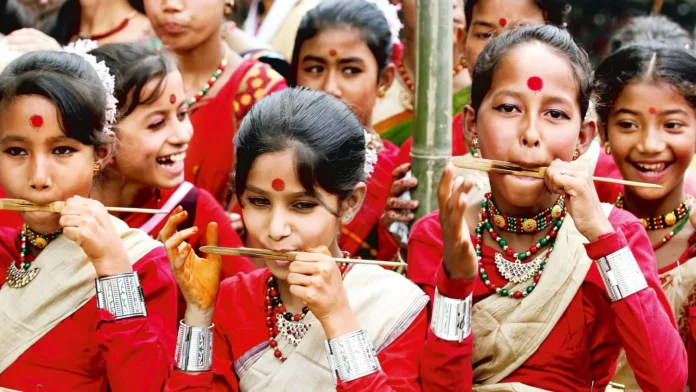The annual Rongali Bihu celebrations in Baksa district of Assam kicked off with an explosion of color, music, and excitement as locals came together to mark the most important day of the Assamese New Year. The first day of Bohag, known for its cultural significance, was celebrated with traditional fervor and joy, reflecting the essence of Assam’s deep-rooted customs. This year, the festivities saw a remarkable addition—an array of traditional games that added even more excitement to the already vibrant atmosphere.
The games, which are an integral part of the Bihu celebrations, attracted large crowds from surrounding villages. These games not only provided a thrilling spectacle for onlookers but also brought people together, fostering unity among the diverse communities in the region. The locals participated eagerly, and the games provided a unique platform for them to showcase their strength, agility, and skills passed down through generations.
In a display of the region’s rich cultural heritage, the traditional games included events like tug-of-war, bullock cart races, and the famous bamboo dance, which had both participants and spectators on the edge of their seats. The bullock cart races, a highlight of the day, saw teams from different villages competing in a friendly yet fiercely competitive manner. The participants steered their carts through muddy fields, demonstrating their precision and control, much to the delight of the cheering crowd.
The tug-of-war competition also proved to be a crowd favorite, with teams from various villages pulling the heavy rope in unison. The competition was not only a test of physical strength but also of teamwork and coordination. Both the young and the old eagerly participated, with the event becoming a symbol of camaraderie and shared joy during the Bihu festivities.
In addition to the games, the traditional Bihu dance performances provided a cultural feast for the eyes. The energetic dance, known for its rhythmic footwork and graceful hand movements, was performed by groups of young men and women, all dressed in traditional Assamese attire. The beats of the dhol, a traditional drum, resonated through the air, adding to the festive spirit of the occasion. The dances, often performed in groups, were an expression of joy and thanksgiving for the harvest, marking the arrival of the new season.
The highlight of the day was the sense of unity that prevailed throughout the celebrations. People from all walks of life, irrespective of their social or economic backgrounds, participated in the festivities. The traditional games, dances, and music created an atmosphere of inclusivity, where everyone could come together to celebrate their shared cultural identity. The games not only served as entertainment but also as a reminder of the region’s agricultural roots and the close connection that the people of Baksa have with the land.
The local authorities also took the opportunity to emphasize the importance of preserving traditional customs, particularly the games that have been passed down for generations. Assam’s Rongali Bihu has always been more than just a celebration of the new year; it is a time for the people to come together and honor their history, culture, and agricultural roots. The games, in particular, serve as a bridge between the past and the present, ensuring that these age-old traditions are not lost to time.
As the day drew to a close, the entire district was immersed in the warmth of the festival. The traditional games, coupled with the Bihu dances and songs, made the day an unforgettable experience for everyone involved. The colorful festivities in Baksa reflected the joy and optimism that come with the arrival of a new year, and the celebration of Rongali Bihu was a perfect example of how tradition and community spirit continue to thrive in the region.
For the people of Baksa, this year’s Bihu was not only about celebrating the Assamese New Year but also about coming together as a community, embracing their heritage, and enjoying the timeless joy of traditional games and cultural festivities. The games and celebrations were a reminder that no matter how much times may change, the spirit of Bihu will always remain a central part of Assamese life.




